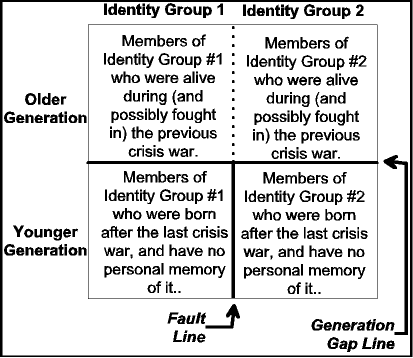Exactly. You now acknowledge that wars occur during awakenings, they themselves are not awakenings. Thus, the Vietnam war is an awakening war because it occurred IN the 1964-1984 Awakening. Similarly, the Spanish-American War is an awakening war because it occurred IN the 1886-1908 Awakening. And the English Civil War is an Awakening war because it occured IN the 1621-1649 awakening.Originally Posted by John J. Xenakis
You said this: S&H do not say that the English Civil War was an awakening in England
They don't call any war an awakening because a war isn't an awakening.
They do describe a Purtian Awakening that occurred between 1621-1649. In there description of this Awakening they describe events in England, including the execution of Charles I, which is part of the ECW. You didn't buy this description as evidence that S&H include the ECW in their Purtian awakening. You had problem with the word enthusiasm.
Well, was there an awakening in England during the Reformation? Here is their description:
No mention of an awakening, just that word enthusiasm.The Protestant Reformation (Second Turning, 1517-1542) began in Germany with Martin Luther?s famous protest and spread swiftly to England. The enthusiasm peaked (in the mid-1530s) with King Henry VIII?s break with the Papacy, William Tyndale?s Bible, popular reform movements, and Parliament?s confiscation of vast Church estates. It ended when reformers tired or (like Thomas Cromwell) were executed, and when foreign wars with Scotland and France diverted the popular imagination.
Now if the 1517-1542 period is an awakening in England according to S&H, then the 1621-1649 period is too. And this means that the ECW falls inside this awakening and so is NOT a Crisis in England in the eyes of S&H.
************************************************** ***
Some of the turnings S&H describe, like the Reformation apply to England, but NOT to America. You can tell this because S&H do not discuss American events in their description for the Reformation.
Some of the turnings, like the Transcendental Awakening apply only to America, NOT England. You can tell this because S&H discuss ONLY American events in their description for the Transcendental Awakening.
But one turning, the Puritan Awakening, applies to both America and England. You can tell this because S&H discuss both American and English events in their description for the Puritan Awakening.
The Puritan generation is the only American generation, of whom none were born in America. When they were born there was no New England. So they are an English generation, some of whom came over to America and gave birth to the first American generation. In 1621 when the Awakening began, the Puritans were all still in Old England, and it was an Awakening in Old England. It was not a Crisis. S&H claim that this Awakening lasted until 1649.
Nowhere do S&H say that the awakening that began in 1621 in England ended there before its counterpart in New England did.
It is quite clear to me that when S&H discuss Anglo-American turnings they mean that the early ones, up to Merrie England, are English and that the later ones, from Reaction and Restoration on, are American.
But the Puritan Awakening is both English and American because New England is created during this Awakening. New England is not in existence for the entire period and so it cannot be exclusively American.
Once American-born Cavaliers come of age, then America begins its own saeculum.
- Join Date
- Jul 2001
- Location
- Kalamazoo MI
- Posts
- 4,501



